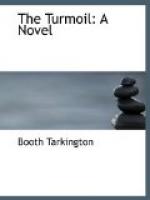The politicians let the people make all the laws they liked; it did not matter much, and the taxes went up, which is good for politicians. Law-making was a pastime of the people; nothing pleased them more. Singular fermentation of their humor, they even had laws forbidding dangerous speed. More marvelous still, they had a law forbidding smoke! They forbade chimneys to smoke and they forbade cigarettes to smoke. They made laws for all things and forgot them immediately; though sometimes they would remember after a while, and hurry to make new laws that the old laws should be enforced—and then forget both new and old. Wherever enforcement threatened Money or Votes—or wherever it was too much to bother—it became a joke. Influence was the law.
So the place grew. And it grew strong.
Straightway when he came, each man fell to the same worship:
Give me of thyself, O Bigness:
Power to get more power!
Riches to get more riches!
Give me of thy sweat that I may sweat
more!
Give me Bigness to get more Bigness to
myself,
O Bigness, for Thine is the Power and
the Glory! And
there is
no end but Bigness, ever and for ever!
CHAPTER II
The Sheridan Building was the biggest skyscraper; the Sheridan Trust Company was the biggest of its kind, and Sheridan himself had been the biggest builder and breaker and truster and buster under the smoke. He had come from a country cross-roads, at the beginning of the growth, and he had gone up and down in the booms and relapses of that period; but each time he went down he rebounded a little higher, until finally, after a year of overwork and anxiety—the latter not decreased by a chance, remote but possible, of recuperation from the former in the penitentiary—he found himself on top, with solid substance under his feet; and thereafter “played it safe.” But his hunger to get was unabated, for it was in the very bones of him and grew fiercer.
He was the city incarnate. He loved it, calling it God’s country, as he called the smoke Prosperity, breathing the dingy cloud with relish. And when soot fell upon his cuff he chuckled; he could have kissed it. “It’s good! It’s good!” he said, and smacked his lips in gusto. “Good, clean soot; it’s our life-blood, God bless it!” The smoke was one of his great enthusiasms; he laughed at a committee of plaintive housewives who called to beg his aid against it. “Smoke’s what brings your husbands’ money home on Saturday night,” he told them, jovially. “Smoke may hurt your little shrubberies in the front yard some, but it’s the catarrhal climate and the adenoids that starts your chuldern coughing. Smoke makes the climate better. Smoke means good health: it makes the people wash more. They have to wash so much they wash off the microbes. You go home and ask your husbands what smoke puts in their pockets out o’ the pay-roll—and you’ll come around next time to get me to turn out more smoke instead o’ chokin’ it off!”




